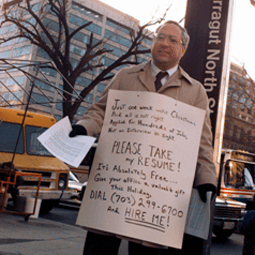The Anti-Resume: Is non-traditional the new answer?
Published: Jun 14, 2012

Rules exist for a reason. But granted, David Crandall is more likely than most to be successful at breaking them. As a marketing and business design pro, it's essentially his job to reinvent the wheel in an eye-catching, attention grabbing fashion.
That's just what he did with a 61-slide "Anti-Resume Manifesto."
With sweeping, inspirational statements from Steve Jobs and splashy, all caps red and grey text, Crandall's "manifesto" reads more like an ad campaign pitch than a plea for a job. But maybe that's the point.
He wants a job as a marketing designer. Creating marketing materials for that purpose makes sense.
But what about the rest of us? Can we get away with alternative job search materials?
Maybe. It's clear that traditional resumes alone aren't really cutting it anymore. In the good old days, a list of qualifications and your alma mater were enough to get you on the short list for a suitable job. Now, with companies too scared to commit—either by refusing to hire externally or making unrealistic qualification and experience demands for outsiders—simply listing a matching job history doesn't seal the deal anymore.
In the spirit of "anti" resumes, here's a quick "anti-hiring" list of what companies aren't looking for:
- Someone they have to train
- Someone they have to motivate or direct
- Someone they need to find a place for
- Someone who's going to crack under the pressure, workload, or boredom and quit in six months—necessitating yet another long, expensive recruitment process
When you understand companies hiring fears, it makes it easier provide the right information.
Take Crandall's manifesto. He shrewdly fills in all the right blanks for recruiters. Sure, he may be smart—but does he know how to apply himself to a company's problems? Yes: he's saved a company two million dollars, he notes.
He also proactively confronts any questions about, well, his proactive-ness, touting his ability to "Analyze a system, Identify opportunities, Improve the system."
He also shows a comprehensive understanding of what his role means (as a marketing designer) in terms of the big picture: communicating "complex ideas," designing them in "unique ways," and influencing an audience those ideas.
Perhaps most importantly, his experience isn't bracketed by years at different companies or with job titles, but measured in "over 10,000 hours of designing." That's tangible.
There's a pattern at work here: Crandall, the job seeker, is doing the critical thinking for the company--not expecting them to know where they want to put him, to tell him what his job is, or to motivate him.
Rather, Crandall knows what he's good at, and what makes him happy at work: "I'd like to do these 3 things: Solve problems that are interesting and expensive, Lead others and teach them how to solve problems, Continually improve my ability to do the prior 2 things." [sic]
Imagine how seductive that might seem to a burnt out recruiter.
You don't have to abandon your resume, but take note of what's working here: having a tangible, well-thought out plan--for yourself, for the company, and for a mutually beneficial future.
Have you seen any other interesting job search materials? Agree or disagree with non-traditional methods of hunting for work? Let us know in the comments below!
--Cathy Vandewater, Vault.com
Read More:
My ANTI-Resume Manifesto (Slideshare)
Why You Shouldn't Lie on Your Resume (and what happens to those who do)
Call Me, Maybe? 4 Rules for Effective Business Cards
Cursing at Work: Yay or Nay?
